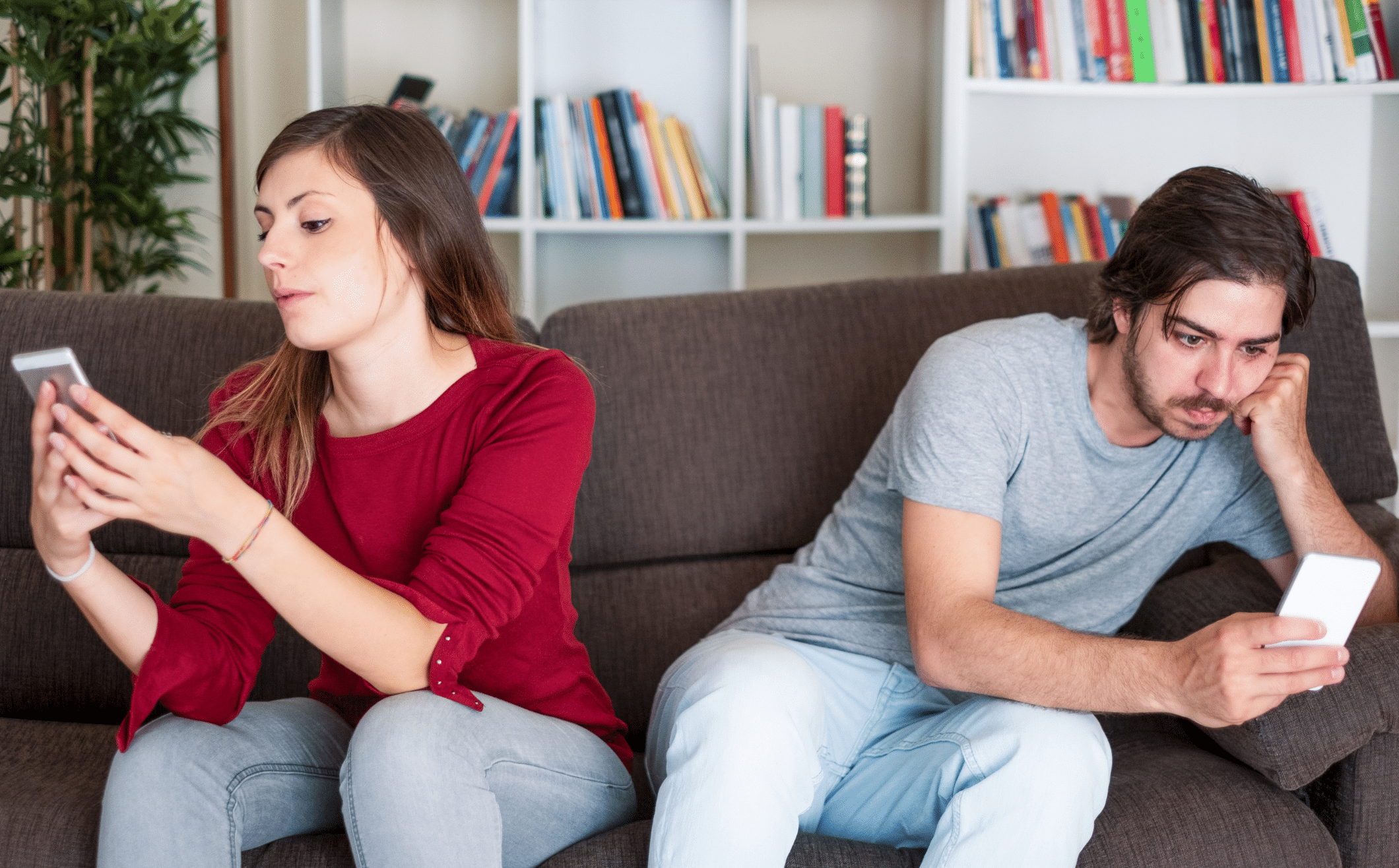
Phubbing (pronounced fubbing) is a relatively new word and is a combination of phone and snubbing. Phubbing describes the habit of snubbing someone in favor of a mobile phone.
It is hard to imagine a world where we could live phone free. Unfortunately, many of us are living in the other extreme, perhaps approaching phone addiction. For years, people have warned us that using social media on our phones disconnects us from real-life people.
This behavior comes between partners.
My husband is always on his phone ignoring me! I feel hurt!
My wife is always on her phone!
My wife spends all of her time home from work on her phone!
What effect does this kind of tech addiction have on a marriage and what can you do to stop phubbing?
Research on phubbing and couples
In today’s digital age, it’s no surprise that technology has become a prominent presence in our lives. Our phones are always with us, from morning to night, and it feels like they are stuck to our hands. However, this constant connection to our devices has started to take a toll on our relationships, particularly in marriages.
A new study in Computers in Human Behavior examined how phubbing affects marital satisfaction.
The study examined 712 surveys and discovered that the higher the phubbing in a marriage, the lower the marital satisfaction. We can’t say for sure if being unhappy in a marriage causes phubbing or if phubbing causes unhappiness in a marriage. It could be a combination of both.
Some unhappy married people may use their phones to escape or distract themselves from their dissatisfaction. However, constant phubbing can also lead to feelings of neglect and disconnection, ultimately eroding the foundation of a relationship.
Regardless of the primary driver, the solution is clear. If your marriage is struggling and phones are causing problems, put your phones away and focus on each other.
Missing bids and shared experiences
John Gottman talks about “bids” between partners. These are bits of emotional communication between partners and are often very small day to day moments. Think about some of the things you have done to get your partner’s attention. Maybe pointing out a funny billboard, making a face at them, referencing an “inside joke”.
Acknowledging and responding positively to these bids is how couples build their emotional bank account. When partners regularly phub each other, they will inevitably miss opportunities to connect and may even offend each other.
Phubbing also creates large gaps in our emotional experience.
My husband and I are sitting next to each other. I am watching our children do the dinner dishes without fighting (a woman can dream). My husband is reading an irate email from a client on his phone. I reach over to touch his arm and share the warmth.
He flinches and looks up with frustration. His heart rate is climbing ready to give this guy a piece of his mind. He is not mad at me, he’s mad at Bob, who is not even in the room.
Yikes. We missed each other on that one.
Talk it through, what do these things mean to each of you?
If phubbing is causing problems in your relationship, talk about it. Additionally, if you feel disconnected from each other due to excessive phone use, have a conversation about it. Ideally, this would be a conversation when you aren’t in conflict.
Set aside some time (device-free) and talk about what “staying connected” means to you. Pay attention to moments where you might feel defensive or critical of your partner.
People use phones for various reasons. Your task is to be a detective and understand your partner’s motives.
Take turns talking and listening; bonus points if you take notes while the other person speaks. This is similar to the Gottman Rapaport intervention that therapists guide couples through in our intensives.
Make a plan
Now that you have an understanding of each other create a plan and set some boundaries. Now it’s time to decide what your “phone etiquette” will be at home. Here are some areas where you might consider setting some boundaries around phone use:
- Dinner time?
- In the bedroom?
- Family vacations?
- Date nights?
- While watching shows together?
- Weekends?
- Weeknights?
- Scheduled “digital detoxes”?
Each of these settings may have a different expectations (always, sometimes, never). You might have some rules around communication. When I anticipate work calls, I will tell my family beforehand that I might have to leave dinner.
Practice makes progress
Create a fair plan for technology limits and be kind to each other; solving the issue of phubbing in a relationship requires teamwork.
Additionally, make a conscious effort to engage in meaningful conversations and activities that foster emotional connection. Plan date nights, go for walks, or simply spend quality time talking and listening to each other. Invest in your relationship to rebuild intimacy and trust lost due to phubbing.
Remember, technology should enhance our lives, not replace the human connections we hold dear. By acknowledging the negative impact of phubbing and taking action, couples can regain happiness and satisfaction in their marriage.
If you have a problem with using your phone too much, talk about it in your weekly “state of the union” meeting.

